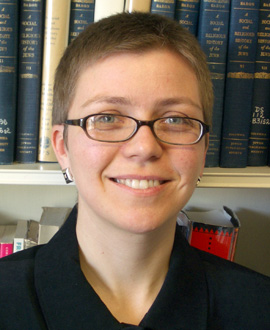Annual Workshop Explores Jewish Culture through Early Literature
| Posted 05/15/08 |
 Associate Professor of History Magda Teter has received a $14,000 grant from the Radcliffe Institute for Advanced Study at Harvard University to help with the operating costs of the sixth annual Early Modern Workshop (EWM) in summer 2009. The workshop will explore the topic of History of Reading across Cultures: The Jewish Book and Its Readers in Early Modern Europe. Associate Professor of History Magda Teter has received a $14,000 grant from the Radcliffe Institute for Advanced Study at Harvard University to help with the operating costs of the sixth annual Early Modern Workshop (EWM) in summer 2009. The workshop will explore the topic of History of Reading across Cultures: The Jewish Book and Its Readers in Early Modern Europe.
The workshop seeks to form collaborative interaction between scholars of Jewish history, early modern history and literature and to facilitate cross-fertilization of ideas between them. Workshop participants will be examining how Jewish readers coped with the advent of the printing press and what the areas of direct or indirect interaction between Jewish and Christian readers were, according to Teter, who is the director of the EWM project. The 2009 workshop will be co-sponsored by Wesleyan and Harvards Jewish Studies Program, along with other institutions to be named, and will be held at the Radcliffe Institute. Every workshop held since the first EMW (hosted at Wesleyan in 2004) has proven successful, Teter says. Participants of the first workshop were surprised at the level of interaction and discussion, the give and take was much more dynamic than at a typical conference when a paper is presented following a question and answer session, she says. The format of the workshops is what makes them stand out. Instead of asking scholars to prepare papers, we asked them to prepare primary documents in the original language and in the English translation and present these texts in a seminar format, Teter says. The text of the documents is available on the EMW website, http://www.earlymodern.org/, along with videos of the workshops. The submitted texts are searchable. Teter edits all of the workshop videos for content. She credits Manolis Kaparakis, academic computing manager for the Social Sciences and director of the Quantitative Analysis Center, and others at Information Technology Services with helping to make sure that all of the videos and text updates are available on the website in a timely manner. This years workshop is Law: Continuity and Change in the Early Modern Period.” The Early Modern Workshop certainly put Wesleyan on the map as one of the main players in innovative scholarly communication and in Jewish studies, she says. The workshop helped consolidate a field that was not recognized widely in Jewish studies: the early modern period. Traditionally, Jewish history was divided into Biblical, ancient, medieval, and modern. Those of us who worked on the sixteenth century were lumped as ‘medieval,’ those of us who worked on early eighteenth century were labeled ‘modern.’ We did not have opportunities to talk to each other, no conference panel would ever put us together, so the Early Modern Workshop became a venue for us to meet and talk, at the same time creating a wonderful Internet resource. The Early Modern Workshop created a fantastic opportunity to bridge research and pedagogy. |
| By Corrina Balash Kerr, associate director of media relations |

